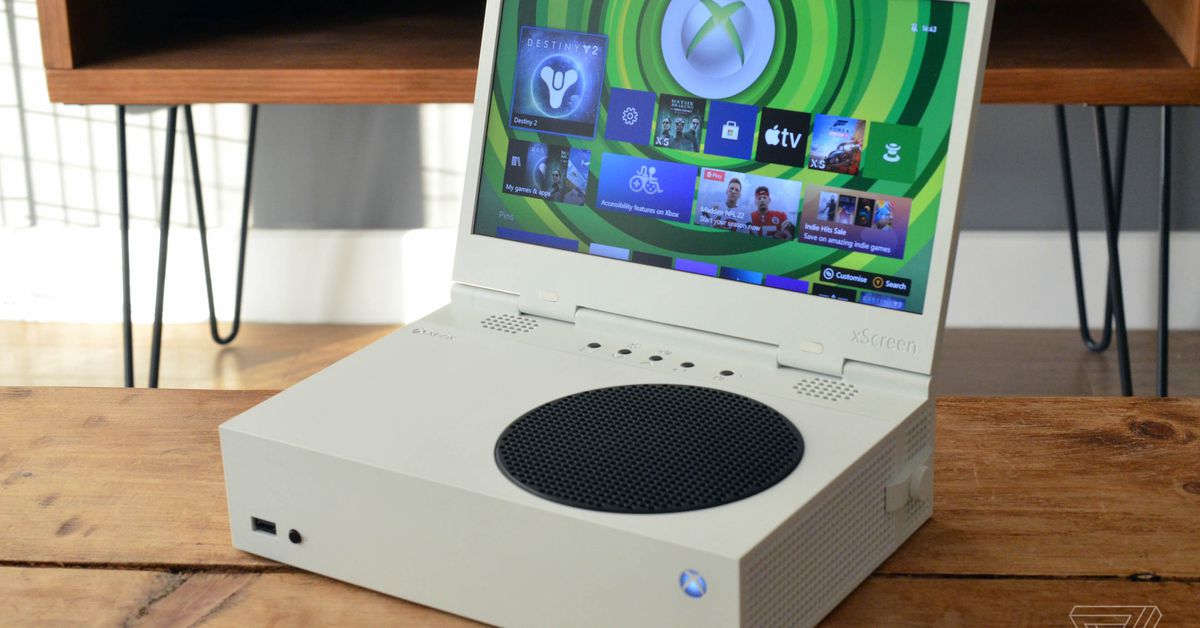Subscription services are changing our relationship to gaming
Cath Virginia / The Verge | Photos by Vjeran Pavic and Getty ImagesIn countries like Argentina, where physical games are exorbitantly expensive, services like Game Pass present a more affordable — but flawed — alternative. Continue reading…
/cdn.vox-cdn.com/uploads/chorus_asset/file/25229271/236948_PHYSICAL_MEDIA_GAMEPASS_CVIRGINIA.jpg)
The soaring cost of video games is leaving many players behind. In countries like Argentina, where hyperinflation hinders the act of playing and collecting games, access to these experiences is becoming a luxury. As physical copies become harder to purchase, subscription services like Xbox Game Pass are becoming a more affordable alternative. But these services aren’t just influencing the way we pay for games — they’re changing how we think about them, too.
“When a single video game equals a quarter of your salary or more,” Reddit user uri_nrv says, “you stop caring about the sense of ownership and instead conform yourself with playing it and moving on.”
I spoke to over 40 people across local subreddits and Facebook groups, and the overwhelming sentiment around preservation is one of resignation. The ongoing economic crisis makes it nearly impossible to build a library capable of withstanding license expirations or game delistings. As the country faces a reality where video games are more expensive than ever, players are forced to scrounge for alternatives they haven’t considered before.
The past few months, in particular, have put this predicament to the test for Argentine players. Back in 2017, Steam implemented regional prices. Starting on November 20th, 2023, the company announced pricing was being reverted to USD again — simultaneously affecting Turkey in the process — due to “exchange rate volatility in recent years,” making it hard for game developers to choose appropriate prices for their games. Steam also mentions “foreign exchange fluctuations, fees, taxes, and logistical issues” being crucial factors in this setback.
Shortly after the announcement, people across social media shared their discontent, mourning a positive change that had allowed a large majority to build their digital libraries. This wasn’t the first time that pricing was affected in the region. After a regional pricing recommendation update from Steam in late 2022, third-party site SteamDB ran a calculation that prices would be increased to up to almost 500 percent. This rippled across most games, but it was still largely cheaper due to the local currency remaining in place.
The November 20th update did not only convert the currency but also bumped prices sporadically. A summary by TikTok user ShuxTeam, which saw almost 800,000 views, included a few examples: Far Cry 5 went from the equivalent of $2 USD to $49, Stardew Valley went from 50 cents to $15, and Civilization VI went from $1.50 to $60.
Image: Sega
It’s important to keep in mind that these prices are all estimates and will most likely be outdated when you read this, as the ARS to USD conversion is ever-changing due to devaluation. The prices are also pretax, which fluctuated from over 100 percent to 65 percent in a matter of weeks for online purchases. For a more practical example, purchasing Mortal Kombat 1 Premium Edition on Steam equals $151,170 ARS, which is a month’s rent for a studio flat (on the cheaper side) in Buenos Aires. As of December 29th, the monthly minimum wage in Argentina was $156,000 ARS.
Of the people I spoke to, there was a wide range of opinions on subscription services like Game Pass. Almost half of them consider the service to be a viable alternative to buying games, physical or otherwise. Others rely on the long-established presence of Steam out of force of habit. Those committed to preservation continue to pursue physical copies whenever possible, despite their higher price. DRM-free options like GOG are also helping out in that regard within the digital space. But not all games are available on every platform, and pricing can vary considerably between them.
In Argentina, the simple act of purchasing a game requires myriad considerations. For one, everybody engages with the hobby differently. “Thanks to Game Pass, using cloud gaming on the TV allowed me to retrieve my PC back from the hands of my son,” says Reddit user Background-Advice-80. “All for the equivalent of four packs of cigarettes.”
While Argentina isn’t safe from the recent price increase of the service, Game Pass remains, on paper, a fairly economical option for people who want access to a large game library with different device options. At the time of publication, the basic tier was priced at around $7,000 ARS after taxes, with Ultimate, the one tier that includes cloud games, being around $11,000. Again, due to inflation, the equivalent has already exceeded four packs of cigarettes (currently priced around $1,600 ARS) over a month since the interview. But it’s still a far cry from, say, paying $57,000 ARS for Starfield on Steam.
“Game Pass works for me with games that I have no intention of buying due to how expensive they are.”
Some users don’t see themselves committing to a long-term subscription for now, opting for paying on a month-by-month basis depending on which games are available. Two people I spoke to mentioned Like a Dragon Gaiden: The Man Who Erased His Name as a recent example. “It’s the same as Netflix,” user FZJavier says. “Some people watch a ton of films and others only watch a few things but have no interest in owning a physical copy of them. Game Pass works for me with games that I have no intention of buying due to how expensive they are. I was able to finish Gaiden within a month and then unsubscribed shortly after.”
Those willing to bet on the service in the long term are encountering particular obstacles, one of them being sporadic catalog retention. Xbox’s subscription offers an ever-shifting library, and the public doesn’t always know when a game they’re playing might leave the service. Persona 4 Golden and Persona 3 Portable are recent cases of this — the announcement that both lengthy RPGs would be leaving the catalog took place 11 days before the deadline. Sure, the remake Persona 3 Reload will be available on Game Pass on day one. But if you wanted to play the existing version, you’re out of luck, as the remake is essentially replacing it.
Those concerns aren’t exactly addressed by purchasing games digitally. If Steam were to disappear tomorrow, a user’s library of games would not be available anymore due to DRM. In the past few years, this has led to resignation for many, resulting in folks just playing what they have while they can. “Lately, I feel like the only games that are actually ‘mine’ are the PS3 copies I have on my bedside table,” user GustavNZ says.
Image: Atlus
The problem is that this hints at a future where increasingly more people will stop having licenses to digital games, even less so physical copies of them. Such concerns tie in with larger worries over preservation. Over the years, multiple games have become unavailable to purchase or been delisted altogether on Steam; Deadpool, Alpha Protocol, and Kane and Lynch: Dead Men are just some examples. Others have been replaced by remasters, like the original versions of Grand Theft Auto III, Grand Theft Auto: Vice City, and Grand Theft Auto: San Andreas, or the first two games in the Metro series.
When you combine all of these elements — along with news like Best Buy removing physical media from stores across the US — you end up with more users shifting to piracy. In 2020, I reported on how rising prices and the release of next-gen consoles wouldn’t be able to keep up with Argentina’s reliance on piracy to enjoy this hobby. More than three years later, everything has gotten more expensive — and not just from a local perspective. First-party titles now cost $69.99 USD on PlayStation and Xbox, with games like the NBA 2K series and Baldur’s Gate 3 following suit. These new industry practices are further aggravated in countries with hyperinflation.
“Green Steam” is a term coined by Argentine folks in recent times, alluding to uTorrent’s logo. It has been a constant mention in recent months, with many of the people I spoke to suggesting that piracy will become more prominent than before. “Game Pass is a great alternative if you want to play legally,” user Tyr9999 says. “If not, there’s piracy. And I don’t say so just for the ‘free’ factor: piracy is also a great preservation method for games. I know Starfield isn’t mine, but I’m also aware it’s been archived by a ton of people already.”
Aside from piracy, those who aren’t interested in new releases have extensive backlogs to go through, a sentiment shared by many during interviews, especially those who bought Steam games in bulk when prices were in ARS, with holiday sales providing a good opportunity to do so.
“Game Pass is a great alternative if you want to play legally. If not, there’s piracy.”
User-made tools like Impuestito (“little tax” in Spanish) are helping those who are still willing to purchase games. Lucas, a programmer living in Buenos Aires, has been working on it since late 2021. It started as a convenient way to calculate taxes for services like Netflix and Spotify, with both a site and a browser plug-in that automatically does the math for you. He’s recently released a new extension and Discord bot that also flags whenever a game on Steam is available on Game Pass. On average, around 80,000 total users visit the site weekly, half of them being unique users.
It’s difficult to know how many Argentine users are currently subscribed to Game Pass. When asked, Xbox spokesperson Ludwig Kietzmann said it’s against company policy to share region-specific numbers. Earlier this year, Microsoft said that the service had 34 million total subscribers.
At the core of it all, the way in which people are paying (or not) for games has an influence on how they think about them. When Steam had regionalized pricing, it was easier to purchase smaller games, resulting in discoverability merely due to a low price. Now, buying multiple games in bulk is becoming a rarity, even during holiday sales. For Game Pass subscribers, curation is dictated by Xbox, which decides what will be available to play and for how long, with no input from users.
Sure, everybody has a backlog to tackle. But new releases will have a tough time in regions like Argentina. Few people will be willing to purchase a first-party game at full price, let alone an indie title out of sheer desire to support a developer. For everybody else, video games will be no different than watching Netflix: experiences meant to be consumed promptly before they’re inevitably shuffled or lost entirely. It seems the number of people committed to securing a physical or DRM-free copy to preserve media is decreasing by the day.
“The amount I used to spend in a year or more is what I’ll be spending on just one game that I like,” user BraMMa_ concludes. “Times have changed… we’ll have to adapt.”

 ShanonG
ShanonG 































